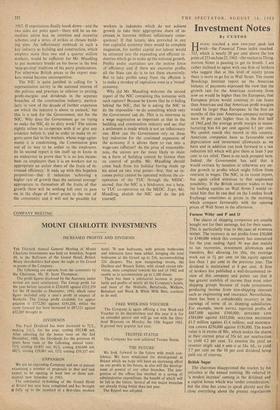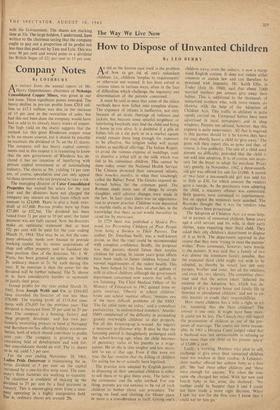Investment Notes
By CUSTOS
HAVING reached a new two-year peak last week—the Financial Times index touched
323, which is nearly 28 per cent above the low point of 253 onJune 25, 1962—the market inThrog- morton Street is pausing to get its breath. I am rather inclined to agree with one firm of brokers who suggest that at this level of equity prices there is more to go for in Wall Street. The recent Brookings Institute report on the American balance of payments expressed the view that the growth rate for the American economy from now on would be higher than the European, that European prices would continue to rise faster than American and that American profit margins would be larger than European. In the first six months of this year American company earnings were 10 per cent higher than in the first half of 1962 ,and the average profit margin in manu- facturing was 6.6 per cent against 6.1 per cent. We cannot match this record in this country. American companies have as favourable new depreciation and investment allowances as we have and in addition can look forward to a tax reduction bill which will give them at least 5 per cent in tax relief. There is no such prospect here. Indeed, the Government has said that it would restrain by taxation or otherwise any un- due growth in profits which might follow from restraint in wages. The NEC, in its recent report, has again called attention to that unpleasant possibility. If the British investor wishes to buy the leading equities on Wall Street I would re- mind him that he can deal on the London Stock Exchange sometimes at prices in the morning 'which compare favourably with the opening prices of Wall Street in the afternoon.
Furness Withy and P and 0 The shares of shipping companies are usually bought not for their earnings, but for their assets.
This is particularly true in the case of FURNESS WITHY. The recovery in net profits from £56,000 to £340,000 which this company has announced for the year ending April 30 was due mainly to tax recoveries, investment allowances and transfers. But allowing for this, the earnings work out at 5f per cent on the equity against less than 1 per cent in the previous year. The dividend is maintained at 8 per cent. A firm of brokers has published a well-documented re- view of this company and points out that it has greater stability of income than most other shipping groups because of trade investments producing income from non-shipping interests such as engineering and insurance. Nevertheless, there has been a considerable recovery in the earnings of some of its shipping subsidiaries. For example, SHAW SAV ILL reported profits of £667,000 against £160,000; HOULDER LINE £584,000 against £432,000; HOULDER BROTHERS £1.5 million against i1.4 million; and MANCHES- TER LINERS £256,000 against £150,000. The assets value is in excess of 80s., which makes the shares, at their current price of 35s 6d. not unattractive to yield 4.2 per cent. To sweeten the yield an investor might add P AND o at 34s. 6d., to yield 5.7 per cent on the 10 per cent dividend being paid out of reserves.
British Sugar
The chairman disappointed the market by his reticence at the annual meeting. He referred to 'a modest increase' coming in the dividend and a capital bonus which was 'under, consideration,' but the time has come to speak plainly and dis- close everything about the present negotiations
with the Government. The shares are marking time at 33s. The large holders, I understand, have written to the chairman saying that the company ought to pay out a proportion of its profits not less than that paid out by Tate and Lyle. This was over 50 per cent and would point to a dividend for British Sugar of 121 per cent to 15 per cent.































 Previous page
Previous page